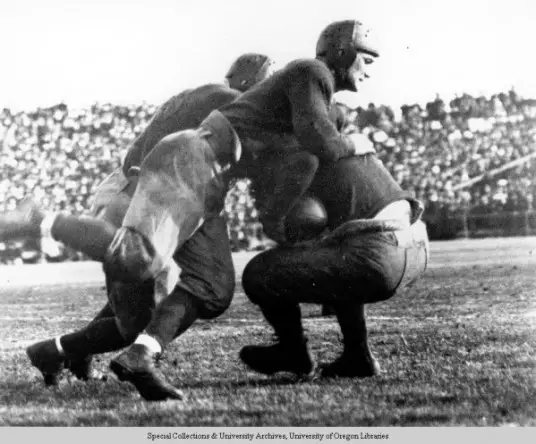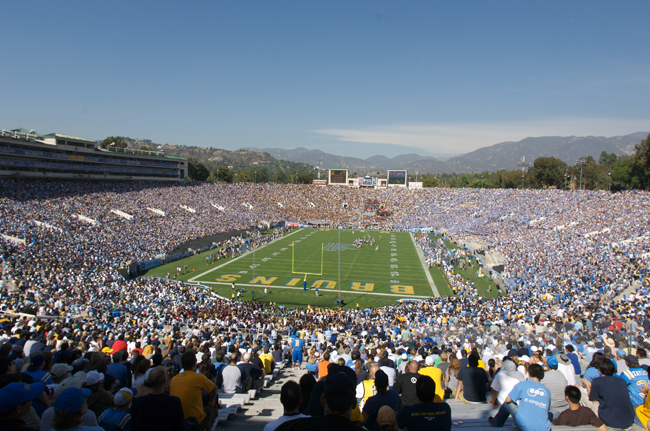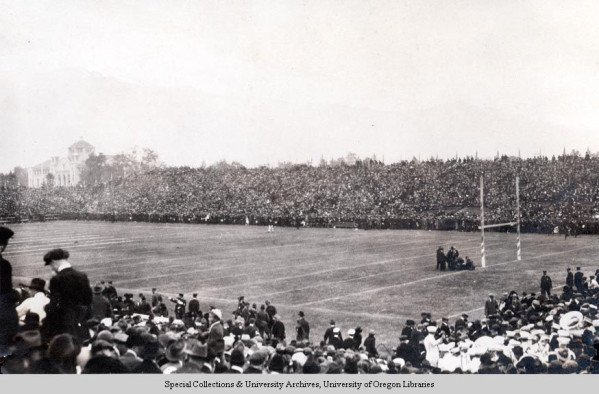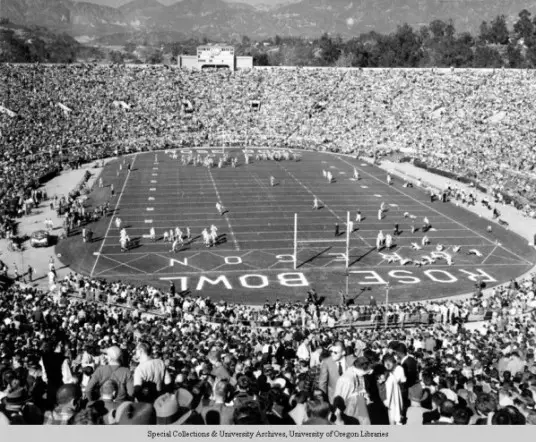Today’s article is a guest contribution from Portland author/journalist Brian Libby.
It was January 1, 1917. The country was just three months away from entering World War I, which had already been underway for three years. The Bolshevik Revolution was bringing Communism to the newly formed Soviet Union. Woodrow Wilson was president and Babe Ruth was still a pitcher.
This was the last time our beloved Oregon Ducks, for all the achievements that have come since—Pac 10 championships, Hall of Fame players and coaches—have won the Rose Bowl.

Oregon QB "Shy" Huntington is tackled by two Penn defenders. Oregon defeated Penn 14-0 to win the Rose Bowl in 1917, the last time Oregon won 'the Grandaddy of Them All.' Photo courtesy: Special Collections & University Archives, University of Oregon LIbraries
For all the frustration and disappointment we green and yellow partisans feel after the Disaster in Dallas, when a winnable game became an avalanche of mistakes and missed opportunities, there is still something vital to play for: victory in Pasadena. If winning a national championship is the be-all, end-all for any team, Oregon’s quest for Rose Bowl glory over the past century or more has been a story of one long-ago success and since then a series of droughts punctuated by the occasional Pac-10 title and Rose Bowl loss.
Yes, the Ducks did win one other January bowl game in the ensuing years: the 2002 Fiesta Bowl, in which the Mike Bellotti and Joey Harrington-led squad played because the Rose Bowl was serving as that year’s national championship game instead. (Never mind that Oregon should have been playing in that game anyway as the nation’s consensus #2 team, but that’s a whole other story.)
Mike Bellotti raises the Fiesta Bowl trophy after Oregon's 38-16 victory over Colorado in 2002
While on paper the Fiesta Bowl win concluding the 2001-02 season was just as much of an achievement as a Rose Bowl win on paper, most college football fans would agree that the annual contest in Pasadena is special. It was college football’s first New Year’s Day game, and pretty much inaugurated the concept. Its history is also more than that of just Pac-10 and Big-10, but as a broader-concept: a clash between the best team from the east against the best of the west.
Originally called the “Tournament East-West football game”, it only began to be called the Rose Bowl Game after the stadium of the same name was completed for the 1923 contest. When Oregon defeated Pennsylvania in a 14-0 shutout that New Year’s Day in 1917, it was at Tournament Park. Spectators either crowded around the edge of the football field, or in horse-drawn carriages.
Ultimately, though, the stadium itself is, along with the Rose Bowl Game’s tradition, part of what makes this an extra special postseason experience to be part of. Although its design was modeled after the Yale Bowl in New Haven, Connecticut, the Rose Bowl is the ultimate symbol of the bowl-style football stadiums.
No matter what the school or team, be they college or pro, bush-league or NFL, all the stadiums are one of two basic architectural styles: bleachers or bowls. The overwhelming majority are bleacher style, as can be found at Reser Stadium in Corvallis or Husky Stadium in Seattle. Here, even if the capacity is huge (like the 70,000 at UW), the concept is the same: seats going back on four risers along the sidelines and the end zones. If they get big enough on the sidelines, upper decks are added.
Bowl stadiums are more rare but many of them are also among the most celebrated in sport, such as Michigan Stadium, Notre Dame Stadium, our own Autzen Stadium, and the Rose Bowl’s cross-town neighbor, Los Angeles Memorial Coliseum. These are not only buildings that ooze college football because of their history, but have a special architectural elegance. They are stages for the pageantry of college football that isolate and celebrate the experience in a way that’s different and, at least in my mind, better than even the biggest bleacher stadiums. In a bowl, the noise and energy doesn’t seep out at the corners, with parking lots and portable toilets. You’re enclosed in the action of the game: the theatrical experience is heightened.
I know what you’re thinking: It sounds inherently silly to talk about a football stadium this way, like some it’s some new-age crystal or a piece of sculpture. But when you’re in these rarest of football places, be it Autzen or the Rose Bowl, the stage on which the players play and fans cheer contributes greatly to the atmosphere. They can’t be separated from one another. And as truly special as Autzen is, even it yields to the Rose Bowl given how the eyes of the nation are watching the Rose Bowl Game on New Year’s Day.

Few settings are as perfect to watch a college football game at than the Rose Bowl in Pasadena, CA
Those of us who have attended Rose Bowls in the past accompanying Duck teams can attest to the almost mystical sense of wonder that comes over you as you enter the Rose Bowl on a sunny January morning in Pasadena. I was lucky enough to attend the 1995 and 2010 games, and they remain the only times in my life I’ve attended a Ducks loss and still felt a sense of joy just to have been at the game.
Yet it’s been too long—way, way, way too long—since the Ducks have come away from Pasadena victorious. I mean, my grandfather, bless his heart, is still alive and just turned 90 this year. Even he wasn’t born when Oregon secured their only Rose Bowl win in 1917. If the Ducks don’t find a way to win it this season or any of the succeeding 2012-15 seasons, we’ll have gone a century without winning the game.
To give you a sense of context, consider the records of some of the teams Oregon competes with in the Pac-10. Naturally, USC is ahead of everyone in college football by a mile with 24 wins and 33 appearances. Second on the list is Michigan with 8 wins and 24 appearances, with Washington and Ohio State tied at third with 7 wins in 14 appearances apiece. The Ducks are ninth all-time in the number of Rose Bowl appearances with five, but 11 other schools have two wins or more. The Ducks are tied with Washington State, Penn State, Oregon State, Minnesota, Northwestern, Arizona State and Purdue with one Rose Bowl win apiece.
Over the past two decades, the modern Ducks have proven time and time again that they belong with the Trojans, Wolverines and Buckeyes of the world, not the Cougars and Gophers. It’s not an arrogance thing. It’s a proven track record, with victories in recent years over the likes of top-tier programs like Michigan, Oklahoma, Texas and Tennessee. Not to mention two in a row over the Trojans.
But winning the Rose Bowl is still the missing jewel in the Oregon Ducks crown. It can never be bought—not fully, although Cecil Newton or some SMU boosters of the 1980s might have tried. It has to be earned on the field. And make no mistake: after 39 years of my own lifetime, and many more for some Duck fans older than me, I want it bad, and I think it’s safe to say that we want it bad.
It’s not that we haven’t been close. All four times Oregon has lost the Rose Bowl, be it in 1920, 1958, 1995 or 2010, the game has been winnable with the Ducks in the hunt. In 1920, the deficit to Harvard was a single point: 7-6.

Photo of the field and packed grandstands at Tournament Park in Pasadena, California, before the start of the 1920 Rose Bowl game between the University of Oregon and Harvard. Harvard won the game 7-6. Photo courtesy: Special Collections & University Archives, University of Oregon Libraries
In 1958, the opponent, Ohio State, was undefeated and top-ranked in the nation. Yet Oregon came within a field goal (and one key dropped pass) of pulling off an upset for the ages.

In the 1958 Rose Bowl Oregon fought valiantly against national champion Ohio State but came up short, 10-7. Photo courtesy: Special Collections & University Archives, University of Oregon Libraries
In 1995, against undefeated and second-ranked Penn State, the game was tied in the third quarter before the Nittany Lions ultimately pulled ahead for a 38-20 final score. But Oregon left two potential touchdowns unfulfilled in the first half by driving in side the 10-yard line without scoring any points. Danny O’Neil passed for a record-breaking amount of yards in that game. It could have been a mammoth upset too.

The 1995 Oregon Ducks kept the game close until the 4th quarter against Penn St., ultimately losing 38-20.
2010? Oregon was in the game until just a few moments remained. Had an apparent second-half touchdown by a certain running back with a strong uppercut not been fumbled out of the end zone for a touchback and Ohio State’s ball, this loss too might have been a win.

The 2010 Rose Bowl was yet another close-but-no-cigar moment for the Oregon Ducks
And let’s be clear: even though I and other fans may get weepy talking about the glorious pageantry, the majestic architecture, and the high-profile national stage, the time for noble victories has passed when it comes to the Ducks and the Rose Bowl. We need to get the ‘W’ badly. But it so happens that a burning desire is what fuels the drive for Pasadena nirvana. It’s what makes the current players and coaches work long, long hours screaming their voices bare and keeping Maxwell House in business watching video into the night.
So remember, my fellow Ducks, as you either wallow in the frustration of a lost opportunity to write Glendale’s wrongs like I do, or determinedly say “Onward!” and prepare for this Saturday’s game with Nevada: LSU did nothing to Oregon’s chances of winning the Rose Bowl. And should we secure victory in Pasadena this year or next or the one after that, it will be a moment to savor beyond virtually any other. Let’s not just settle for winning the Rose Bowl, but embrace it as Oregon’s most venerable enduring dream. Let’s get Woodrow Wilson off our back and tattoo this oval-shaped wonder with an “O” of our own.
Related Articles:
Brian Libby is a writer and photographer living in Portland. A life-long Ducks football fanatic who first visited Autzen Stadium at age eight, he is the author of two histories of UO football, “Tales From the Oregon Ducks Sideline” and “The University of Oregon Football Vault.” When not delving into all things Ducks, Brian works as a freelance journalist covering design, film and visual art for publications like The New York Times, Architect, and Dwell, among others.
